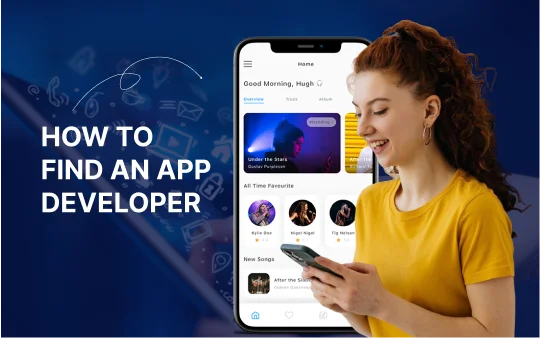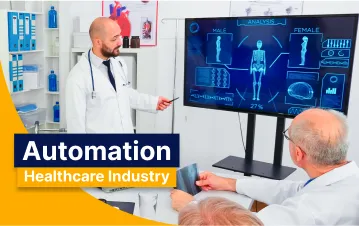The world is constantly evolving, and the healthcare industry is no different. With an increase in chronic diseases like COVID, the demand for better and more efficient healthcare services rises.
This has given rise to a new trend in the industry: healthcare apps. These apps can be incredibly useful for helping patients and healthcare professionals work together, improving the patient experience while increasing the efficiency of doctors and nurses.
Do You Know?
The mobile health market is predicted to continue to rise in the upcoming years and is expected to exceed $300 billion by 2025.
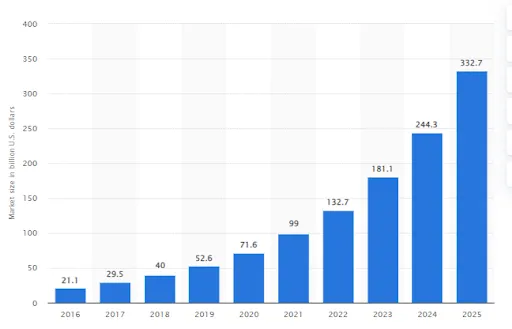
Over 350,000 mHealth apps are available in major app stores (Mobius)
Moreover, Healthcare apps offer a wide range of features and services that can be customized according to the users’ needs. Here view some of the key features of medical apps and various types of healthcare apps that are popular among users.
Must-Have Features And Functionalities In Healthcare Apps
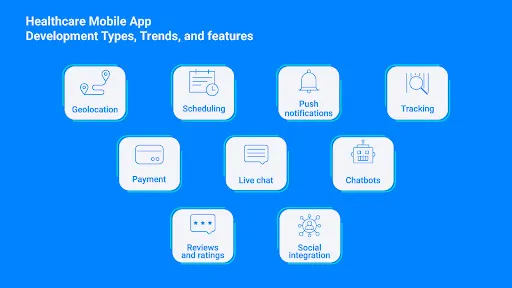
People can use several healthcare apps and mobile apps from their smartphones and computers to track various aspects of their health, from fitness to diet and even disease symptoms. These apps come with several features and functionalities.
ValueCoders mobile app developers create leading healthcare apps and introduce all the key features necessary for an app. Here view a few key features and functionalities that healthcare apps should include:
Registration And Login
An ideal healthcare app should have a simple registration and login process. It should be easy for users to sign up and create an account on your app. The login process should also be hassle-free, requiring only basic information such as an email address or phone number.
Once registered, users should have full access to all features of your app. If you plan to develop a healthcare app, you can use tools like PhoneGap or Xamarin to make it easy for users to register and log in to your app.
Doctor Profile Lookup
This feature allows patients to find out more about their doctor, including their education and professional history. It also allows them to see if there are any complaints or disciplinary actions against that doctor.
Patients can also lookup other doctors based on specialty, location, or insurance coverage. Doctors should be encouraged to provide as much information as possible so that patients can make informed decisions about their care.
Get free consultation and let us know your project idea to turn it into an amazing digital product.
Appointment Scheduling
It is an important factor to take care of in any healthcare app. The apps are built based on four main functionalities, and one of those is scheduling appointments with doctors.
Many patient healthcare apps have enabled scheduling appointments with doctors right through their app so that if you are away from your hometown, it becomes easier for you to schedule an appointment with your doctor when required.
It will save a lot of time and effort. So, scheduling appointments should be available as one of the key features in all kinds of healthcare apps.
Reminders And Notifications
A great feature that improves app compliance is sending timely reminders and notifications to patients. These are often sent directly to their smartphone or mobile device and remind users about their appointments, medications, procedures, and other issues.
Reminders can also be customized by telling them when they need to take their medication, how much of it they’re supposed to take (especially in situations with a specified dosage), and when they should do so.
And many reminder systems go a step further by sending a text message with a personalized link, leading them to information such as who they see that day and what test results are in.
Also read: A Complete Guide For Healthcare App Development
Doctor-Patient Communication
Doctors, nurses, & other medical specialists are increasingly turning to electronic health records (EHRs) to track patients’ conditions. Health apps offer a new way for physicians and patients to communicate digitally, but with that comes security concerns.
EHRs and their apps must allow doctors and patients to share medical information in a HIPAA-compliant manner securely. In addition, HIPAA instructs healthcare providers to protect patient information using encryption and digital authentication, which permits users to access confidential information securely from different locations.
If an app doesn’t follow these protocols, it could result in legal action taken against both doctor and patient.
Access To Medical Records
Every patient should have secure access to their medical records. Doctors and patients need to stay on top of medication, dosages, and side effects so proper care can be administered.
This means allowing them to secure access to their files from any connected device. While some healthcare organizations offer secure portals for patients, these are usually nothing more than a simple PDF reader app.
There is no way to take notes or store files securely. In fact, these services may upload a copy of your records to a third-party server!
Most healthcare organizations don’t even allow patients direct file access; they must first request it through an employee. The files could take days or weeks to reach you if that’s how it’s handled!
Patient Community
Many healthcare app developers promote their apps by allowing patients to connect with other patients and share stories and experiences.
Having a community of minded people can be very comforting, especially when dealing with chronic or lifestyle conditions. The information shared via these communities is often invaluable, so it’s wise to take advantage of them if you’re developing a health app.
It also allows you to build up your app’s reputation before it’s even on sale. Being active in communities shows you care about your users and that you have good ideas!
Also Read: Healthcare App Ideas: 20+ Ideas For Healthcare Professionals
EHR/EMR Integration
With EHR/EMR integration, a practice or hospital will have all its patient records in one centralized database. This way, all of your patient data can be stored digitally and accessed from any location—including smartphones, tablets, and desktop computers.
This is especially valuable for times when a patient needs care from multiple medical professionals at different facilities.
For example, suppose you send a patient to a local emergency room but still need follow-up treatment from your office. In that case, Nextgen EHR integration makes it possible for the patient file to be accessible to the patient and doctor and follow-up with the recovery status.
EHR integration gives healthcare professionals easy access to patients’ full histories, but it also helps eliminate redundant tests that may not always be necessary.
ePrescriptions
E-prescriptions are part of a larger shift to digitize medical records. With e-prescriptions, doctors can write prescriptions for common ailments (like headaches or colds), and patients can fill their prescriptions at any local pharmacy, saving time and money.
Because electronic prescriptions record everything from dosage to when it should be refilled, they cut down on medical errors that come with miscommunication between doctor and pharmacist.
One recent survey found that 75% of consumers said they would opt to use an e-prescription app rather than using paper prescriptions if it saved them time.
Also Read: 10 Mistakes to Avoid While Hiring Mobile App Developers
HIPAA Compliance
According to HIPAA regulations, healthcare providers need to follow specific guidelines for the storage and use of patient data. Of course, many apps are not solely used for healthcare but some of them might contain such information.
If your app does, you need to ensure that it complies with all HIPAA regulations. This includes encryption and firewalls and the procedure for reporting users’ data leaks and third-party access requests.
Not only can you get in trouble if you don’t follow HIPAA regulations, but failure to comply can also cost your organization millions of dollars in fines!
ValueCoders Developers Are Pro At Developing Various HealthCare Apps
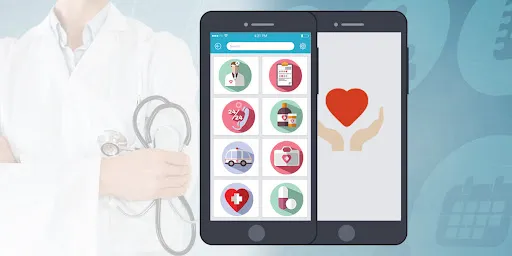
If you’re looking to develop healthcare apps, ValueCoders has the skills and expertise to do it effectively and efficiently. Our developers have been working with applications in the healthcare industry since our company was established in 2014.
Moreover, we have developed enterprise-level applications, patient care applications, and more to help people improve their health or take better care of themselves.
Here are some examples of software development for healthcare that developers at ValueCoders are capable of developing with your goals in mind!
Telemedicine Apps
There are many possible applications for telemedicine. Common examples include apps that allow medical practitioners to remotely monitor patients, provide remote diagnosis and therapy, and conduct video conferencing with other healthcare providers, such as nurses or specialists.
These sorts of apps can help reduce costs by reducing travel time for both patients and health care workers.
Help people avoid a trip to an emergency room by having real-time consultations with doctors when they first notice symptoms that may be of concern or connect people who might otherwise have trouble getting help (e.g., rural communities) with healthcare providers.
For many patients, specifically those in rural areas, access to healthcare is limited; telemedicine allows them to receive care from healthcare professionals no matter where they live.
We proffer highly convenient remote healthcare services by including the following features in Telemedicine apps:
- Safe video appointments with a doctor/nurse
- Doctor/nurse advice between visits
- Remote diagnosing
- Symptoms tracking for collecting detailed data about patients’ health
Patient Engagement Apps
Healthcare providers seek to better connect with patients and encourage patient engagement in their health. ValueCoders developers can help develop apps that allow your patients to update you on their health, schedule appointments, or check out services offered at your facility.
You can also use patient engagement tools like video chats, telemedicine apps, or a remote monitoring program for post-surgical care to reduce hospital readmissions and more.
If you’re interested in developing an app that promotes better communication between doctors and patients, don’t hesitate to reach out.
We have a team of healthcare software experts who can develop engaging patient-doctor communications features across all platforms, including Android, iOS, Apple Watch, and more.
ValueCoders healthcare software developers include the following benefits in the patient engagement apps:
- Access to patient portals
- Search for healthcare professionals
- Health education
- Patient-generated health data trackers, etc
Get free consultation and let us know your project idea to turn it into an amazing digital product.
Medication Apps
Keep track of your medications and any adverse side effects you experience. Medication apps remind you when it’s time to take your meds and how to avoid harmful drug interactions.
If you have any questions about taking a certain medication, you can use an app to find an expert that can help explain everything in layman’s terms. A good medication management app will also keep track of all your health information, including covid 19 symptoms, diet, weight loss progress, and more.
Moreover, such apps can be used as a health journal or personal diary where you can write down anything related to your health. Some of these apps are even equipped with barcode scanners which make entering data more accessible.
When choosing an app for managing medications, look for one approved by a medical professional or endorsed by doctors and pharmacists.
In Medication Apps, ValueCoders developers include the following features:
- Medication plans & intake reminders
- Pill identifiers
- Medication price and location search
- E-prescription, etc.
Wellness Apps
A wellness app can help you eat right, work out more, and improve your sleep. It’s not a replacement for medical advice; it’s a tool to remind you of what you already know so that your healthy habits become routine and then eventually second nature.
The habit tracker may show you how often you’re hitting certain goals (like drinking eight glasses of water per day). At the same time, other features might allow you to scan barcodes at grocery stores and get nutritional information on items at a glance.
Tracking your habits can be a great way to get a bird’s-eye view of how you’re doing overall. But to really change them, you have to understand why you make certain choices.
A lot of apps focus on providing users with tips and tools to help them reach their goals; in many cases, these apps offer simple advice and good reminders that might improve your behavior.
We add the following things to make your Wellness Apps unique and outstanding:
- Fitness and exercise sessions
- Nutrition schedules
- Meditation manuals
- Nutrition calculators, etc.
Rehabilitation Apps
For patients who are inept at returning home after hospitalization or for those who need some form of long-term care due to mental or physical disabilities, rehabilitation apps can help them engage in their exercises on a regular basis.
Apps that help rehabilitate children with cerebral palsy and patients recovering from stroke or severe head trauma would fall under this category.
Additionally, people who have Alzheimer’s disease, Parkinson’s disease, Multiple Sclerosis (MS), muscular dystrophy, and other diseases can use this app.
These individuals may have difficulty remembering how to perform certain tasks, and they could benefit greatly from having all their instructions at hand on an app they can access anywhere at any time.
It could also provide information about nutrition and exercise, so they know what foods will aid in recovery as well as how much activity is required during each stage of treatment/rehabilitation.
We include the following things in our rehabilitation apps:
- Follow-up care plans
- Interactive sessions for neurological rehabilitation
- Rehabilitation journals
- Cognitive skills trainers, and a lot more
Pre- and Postoperative Care Apps
This includes various activities, from browsing medical information to making and taking appointments, storing personal health records, and communicating with your doctors.
Patients who’ve just had surgery and need help returning to normal activity levels after their procedure can use this app. The most important thing is that they give you access to all your relevant healthcare data in one place.
That way, you don’t have to search for it across multiple platforms or devices—and you can see what needs to be done next in terms of recovery and post-op care.
The best healthcare apps for pre-and postoperative care offer scheduling capabilities that let you book appointments on the go, as well as reminders about upcoming procedures or checkups.
You should also have access to any documents relating to your treatment plan—for example, notes about medications or instructions for physical therapy sessions—in case you need a quick refresher on anything related to your procedure before an appointment with your doctor.
Key features that our healthcare software developers include in Pre- and postoperative care app
- Pre-surgery or follow-up visits (schedule)
- Preoperative checklists
- Questionnaires for recovery symptoms
- Post-surgery monitoring
- Physician alerts in case of symptoms
- Medication intake schemes (nutrition, hydration, wound care)
Get free consultation and let us know your project idea to turn it into an amazing digital product.
Chronic Disease Management Apps
These apps can manage chronic conditions, such as diabetes and high blood pressure. Users can log their vital statistics, which is helpful for doctors who want to keep track of patient progress and make notes of possible adjustments or medication changes.
The app will be able to tell if a patient’s vital signs meet healthy benchmarks, so doctors know what course of action to take next. These apps can even set customized reminders for patients about upcoming appointments or medication refills.
Features that ValueCoders healthcare software developers try to introduce in Chronic Disease Management Apps:
- Notifications of planned appointments and lab results
- Medication intake scheme & reminders
- Symptoms log
- Instructions on nutrition, checking vitals, physical activity, etc.
- Gamification techniques to boost patient motivation (e.g., badges, goal-setting).
Conclusion
There’s no doubt that healthcare apps are revolutionizing the healthcare industry—and improving patient care in the process. ValueCoders healthcare custom software development team has worked on a number of different healthcare app development projects and is well-versed in the latest trends and technologies.
So if you’re looking for an experienced healthcare custom software development team to create a cutting-edge healthcare app get in touch with us today. We’ll be happy to discuss your project requirements and give you a free quote.


